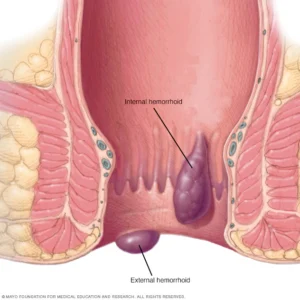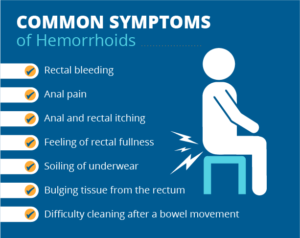What are the cause of bleeding in stools?
Bleeding in stools are the one of the sign of internal bleeding due to any trauma or damage to any part of intestine, inflammation of intestine, anal blockage, ulcer or hemorrhoids etc. Hemorrhoids may cause severe bleeding In rectum part ( part of large intestine). Rectal bleeding is a symptom of conditions like hemorrhoids, anal fissures, inflammatory bowel disease (IBD), ulcers and colorectal cancer. Typically, you notice rectal bleeding on toilet paper, in the water of the toilet bowl or in your stool.
What are hemorrhoids?
Hemorrhoids are swollen, enlarged veins that form inside and outside the anus and rectum. They can be painful, uncomfortable and cause rectal bleeding. Hemorrhoids are also called piles. We’re all born with hemorrhoids, but at baseline, they don’t bother us. It’s only when they become swollen and enlarged that they produce irritating symptoms.

Who might get hemorrhoids?
Anyone can get symptomatic hemorrhoids, even teenagers. (Because hemorrhoids take a while to develop, they’re uncommon in children.) You may be more at risk if you:
- Have overweight
- Are pregnant.
- Eat a low fibre diet.
- Have chronic constipation and diarrhea.
- Regularly lift heavy objects.
- Spend a lot of time sitting on the toilet.
- Strain while having bowel movements.
What are the types of hemorrhoids?
Hemorrhoids can happen inside or outside the rectum. The type depends on where the swollen vein develops. Types include:
- External: Swollen veins form underneath the skin around the anus. Your anus is the canal where poop comes out. External hemorrhoids can be itchy and painful. Occasionally, they bleed. Sometimes they fill with blood that can clot. This is not dangerous, but can result in pain and swelling.
- Internal: Swollen veins form inside the rectum. Your rectum is the part of the digestive system that connects the colon (large intestine) to the anus. Internal hemorrhoids may bleed, but they usually aren’t painful.
- Prolapsed: Both internal and external hemorrhoids can prolapse, meaning they stretch and bulge outside of the anus. These hemorrhoids may bleed or cause pain.
Symptoms:
Signs and symptoms of hemorrhoids usually depend on the type of hemorrhoid.
External hemorrhoids
These are under the skin around your anus. Signs and symptoms might include:
- Itching or irritation in your anal region
- Pain or discomfort
- Swelling around your anus
- Bleeding
Internal hemorrhoids
Internal hemorrhoids lie inside the rectum. You usually can’t see or feel them, and they rarely cause discomfort. But straining or irritation when passing stool can cause:
- Painless bleeding during bowel movements. You might notice small amounts of bright red blood on your toilet tissue or in the toilet.
- A hemorrhoid to push through the anal opening (prolapsed or protruding hemorrhoid), resulting in pain and irritation.
prolapsed hemorrhoids
If blood pools in an external hemorrhoid and forms a clot (thrombus), it can result in:
- Severe pain
- Swelling
- Inflammation
- A hard lump near your anus

When to see a doctor
If you have bleeding during bowel movements or you have hemorrhoids that don’t improve after a week of home care, talk to your doctor.
Don’t assume rectal bleeding is due to hemorrhoids, especially if you have changes in bowel habits or if your stools change in colour or consistency. Rectal bleeding can occur with other diseases, including colorectal cancer and anal cancer.
Seek emergency care if you have large amounts of rectal bleeding, dizziness or faintness.
What are the causes of hemorrhoids:
- Anal infections
- Obesity
- Genetics
- Constipation
- Lower fiber diet
- Sitting for prolonged period
- Pregnancy
- Liver damage

How can hemorrhoids diagnose:
Your doctor can examine external hemorrhoids easily but for diagnosing internal hemorrhoids, he might do examination include:
Digital examination:
Your doctor put gloves on his hand and lubricant fingers into your rectum. They feel unusual growth.
Visual examination:
Your doctor might examine lower portion of rectum or colon with anoscope, sigmoidoscopy procedure, use to see lower portion of rectum or colon by inserting camera in it.
What are the treatment for hemorrhoids:
The hemorrhoids can be treated by:
- Increase dietary fibers as the help in digestion and prevent hemorrhoids.
- Soak your anal area in warm water for 15 to 20 minutes.
- Take oral pain reliever.
- Oral fluids uptake is beneficial in hemorrhoids treatment as they provide mobility to passage of stools .
- NSAIDS medication use for treatment of hemorrhoids
- Rest because in hemorrhoids person unable to walk. If he works, it can worsen the hemorrhoids.
- Steroid ointments medication for treatment of hemorrhoids
- Hemorrhoidectomy the surgical procedures use to treat hemorrhoids if medication does not work properly.
How can you prevent hemorrhoids:
Hemorrhoids can be prevented by:
- Drink plenty of water
- Don’t strain or hold your breath when you trying to pass stool bacause it creates a great pressure on the vein in the lower rectum.
- Eat high fiber diet
- Empty bowels
- Regular exercise
- Not use spicy food
Not lay down after having - meal.
- Avoid long period of sitting.
General health care:
An estimated 15 million Americans have sought treatments for hemorrhoids at some point in their lives. But many more suffer needlessly. Don’t be too embarrassed to talk to your healthcare provider about your symptoms. If hemorrhoids cause pain or discomfort, your provider has treatments that can help. You can also take steps to keep hemorrhoids from coming back.
Author


